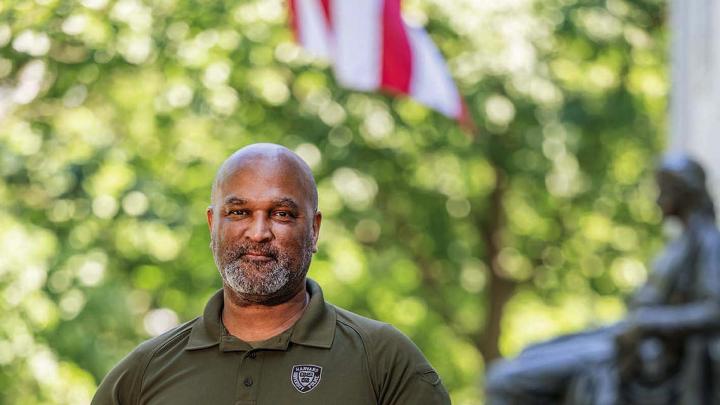On Victor Clay’s twenty-first birthday, in 1984, came a knock at the door. “You want to be a deputy sheriff? Be downtown in two hours.” The Olympics were coming to Los Angeles, his future wife had taken a corporate job, and this was how Clay, who’d been street racing by night just months before, learned that he had passed the test to become a sheriff. The day he was sworn in, he recalls, he was given a cardboard box containing a badge for his uniform, one for his wallet, a revolver, and six bullets. So began a 35-year career in law enforcement, including campus chief positions at Occidental College and Caltech, before Clay became Harvard’s police chief in July 2021. When applying for the job, he was asked to share in one page his perspectives on diversity, inclusion, and belonging. He took nearly five: these topics are “way too important to limit to one page,” he says. In the same vein, “community policing” to him doesn’t mean having officers take one course—it means changing a culture he perceives as outdated and ineffective. Harvard police officers are “part of this community,” he says. “And if we do a really good job, and we’re thoughtful, and we receive critique, and improve after that critique, we’ll get more respect.” Clay is already a presence around campus, often seen walking a dog he rescued from the streets in California. When he first brought her home, he told his wife, Teree (like him, a fan of old movies), they would turn the pup into a princess, and name her Eliza Doolittle, after the character in Pygmalion. Improvement is always possible, he believes, and seems to include himself: he is learning French, and hopes to pursue a degree from Harvard, “because I’m walking across that stage.”
Victor Clay
The new police chief introduces a new policing culture.

Victor Clay
Photograph by Jim Harrison
You might also like
Breaking Bread
Alexander Heffner ’12 plumbs the state of democracy.
Reading the Winds
Thai sailor Sophia Montgomery competes in the Olympics.
Chinese Trade Dragons
How Will China’s Rapid Growth in the Clean Technology Industry Reshape U.S.-China Policy?
Most popular
More to explore
Harvard Philosophy Professor Alison Simmons on "Being a Minded Thing"
A philosopher on perception, the canon, and being “a minded thing”







